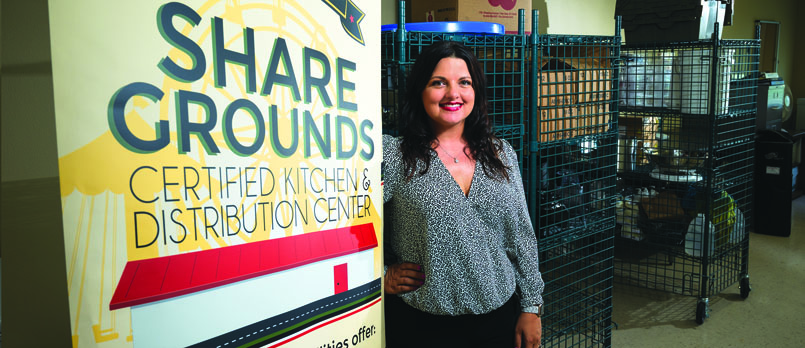31 Jul 2021 Share Grounds helps entrepreneurs move from home kitchen to store shelves
By Dwain Hebda
If you’ve ever mastered a dish or dessert – say, your Granny’s heirloom cinnamon rolls or a top-secret barbecue sauce – chances are you’ve toyed with the idea of taking the product to the masses. Maybe you’ve even heard from friends and colleagues who have sampled your cooking that you’ve got a sure winner on your hands.
But those who have given it a go will tell you – having a winning recipe is just the very tip of a massive entrepreneurial iceberg. The real work lies in addressing the millions of details that come with moving from your personal kitchen to a commercial operation. Labeling, scaling up recipes, materials costs and hiring packaging personnel, all must be done without breaking the bank.

Share Grounds, a new program offered through the University of Arkansas System Division of Agriculture, was created to help Arkansas’s food entrepreneurs do just that.
“If you want to create a food business, you have to understand safety, regulations, what your recipe is, [and] make sure it’s quality,” said Amanda Perez, U of A System Division of Agriculture assistant professor and a specialist in food systems and safety in Little Rock. “We help people manage risk by helping them figure out if their idea is feasible.”
Share Grounds does this by providing facilities and expertise that are equal parts food lab, classroom and production space. Perez, the architect of the program, has been working toward such a program for the past decade and leading formal planning efforts for more than two years.
“We focused most of our efforts on getting a facility set up as a manufacturing plant,” she said. “The university opened a food innovation center on campus to help small businesses get things off the ground and it’s been very successful, but it’s at capacity.”
Replicating the food innovation center was a steep challenge for the organization. Perez said building from the ground up was prohibitively expensive and many existing buildings lacked amenities such as cold storage or sufficient access. Ultimately, the solution for these issues came from an unexpected source.
“If you want to build a food manufacturing facility, you may need to spend a couple million dollars to get everything you need to make it operational,” she said. “Working with communities, we identified that county fairgrounds already have a lot of infrastructure in place – large warehouses, kitchens, roads you can bring trucks in on.
“A county fairground is normally used for a month out of the year, so we reached out to the fair boards and said, ‘Would you be interested in using your facility for alternative purposes if we could develop mini food manufacturing facilities?’ They said yes.”
The name Share Grounds is playfully derived from “fairgrounds,” but the mission is all business.

“These are in rural areas, but within an hour’s drive of an urban center and they have the capacity to allow us, on a shoestring budget, to start a food manufacturing facility,” Perez said. “So instead of us trying to find land and build a $6 million facility in Little Rock, we were able to do this for about $50,000 per site.”
Through grants, Share Grounds was able to create three kitchen incubators and aggregation centers in Marshall, Rison and McCrory. All three sites were completed and ready to go in early 2020, but COVID-19 put the program on temporary hold. During that time, Perez and her team provided technical assistance to many would-be entrepreneurs, helping them refine their ideas and determine feasibility prior to moving to the production phase.
“We’ve helped about 30 businesses with initial development,” Perez said. “In some cases, we had to tell clients, ‘We’re not sure you’re going to make any money off this.’ You can say ‘My granola is the best granola ever,’ but if your costs are $20 a bag, you’re not in business.”
Through that process, six of the 30 entrepreneurs advanced to the next phase of development and production. After everything the program has been through, Perez is excited to see what this phase of Share Grounds yields.
“We’re just getting started in the kitchen,” she said. “From concept to product testing, they can use our kitchen and on-site technical assistance to build their business with less risk. We’re not talking Conagra here; this is for small-scale startups. If someone gets that big, they’ll have to go to another facility. It’s hard to get a food business off the ground, but if it works, people can scale up and get a food packer or a larger facility.”
Which, she added, would be a nice problem to have, especially in rural Arkansas where business opportunities and economic development are often hard to come by.
“Most food hubs take five years to break even, and usually take seven years to get highly productive and profitable,” she said. “My priority is to get these locations to a level of sustainability and to prove that this model works.”
For more information on Share Grounds, visit uaex.edu/business-communities/local-foods, then scroll down and click on the “Share Grounds” logo.
- Conway couple called to serve foster children, families - March 10, 2024
- Artist of the Month: Terri R. Taylor - November 5, 2023
- Everybody loves a nut - November 5, 2023











